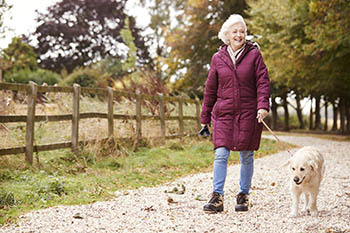Falls prevention
Local falls prevention support services
Falls are serious at any age, but breaking a bone after a fall becomes more likely as we get older. Even if a bone is not broken after a fall, it can make you more fearful of falling again, and this may limit how you live your life.
But it is possible to reduce your risk of falling. The following information explains how to do this in easy steps.
Staying active
If you’re fit, you are less likely to fall. Staying active
can help to keep  muscles strong and improve your balance. Try to do some regular physical activity, such as swimming, gardening, walking or dancing. You can read more about staying active on the Keeping active webpage.
muscles strong and improve your balance. Try to do some regular physical activity, such as swimming, gardening, walking or dancing. You can read more about staying active on the Keeping active webpage.
Alternatively, if you have already experienced a fall or are unsteady on your feet One You Cheshire East run free ‘Stand Strong’ falls prevention classes at a range of locations in Cheshire East. These are friendly, fun and local to you.
Eyes and ears
Protecting your vision and ensuring proper eye health is one of the most important things you can do to help maintain your quality of life as you get older.
As you get older your vision may change, but it doesn’t have to compromise your lifestyle or quality of eyesight. Knowing what to expect and when to seek professional care are important steps to safeguarding your vision.
And it’s not only your eyes, good hearing is also important to reduce the chances of having a fall.
You can find an optician using the NHS Website. Some opticians will also visit someone at their home if they have mobility issues.
Right footwear
When purchasing footwear including slippers you should check that they fasten well, are supportive, have a sturdy sole and are not loose. If you are having problems with your feet you can discuss this with your doctor who may refer you for NHS chiropody or podiatry treatment. Alternatively, you can access this privately.
Medication
Taking more than four medications can increase the risk of falls due to their side effects. You should arrange to visit your doctor or local pharmacist (also known as chemist) for a medication review at least once a year. If you are having a hard time keeping track of medicines or are experiencing side effects, discuss your concerns with your doctor and pharmacist.
Household items
There are lots of things both in the home and outside the home that could cause you to fall, and by doing a Fall Check regularly can help stop this happening.
Alcohol and hydration
Be sensible about alcohol
It’s important to drink alcohol sensibly. Even moderate drinking can increase your risk of having a fall. Mixing alcohol and medicines can also be harmful. Combining alcohol with some medicines can lead to falls and serious injuries, especially among older people.
If you are taking prescription drugs and you are unsure whether it is safe to drink alcohol, please check with your doctor or your pharmacist. See the advice on alcohol page for more information.
Importance of staying hydrated
Drinking plenty of fluids to stay hydrated can help prevent dehydration and also reduce your risk of falling.
Top tips for good hydration
- Keep a water bottle close by to drink throughout the day
- Sip a drink during meals
- Drink before and after physical activity
- Choose a large size cup to drink from
- Swap dry snacks for fruit and veg
Assistive Technology
If you are worried about falling, then Assistive Technology (like a pendant alarm) can be a good way to let someone know quickly if you do have a fall and cannot get up. It can also support in other situations as well.
Further Information
The NHS falls prevention support pages offer additional advice and support.
Page last reviewed: 25 November 2024
Thank you for your feedback.